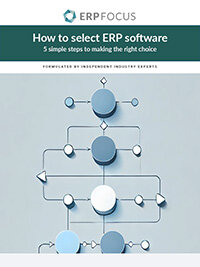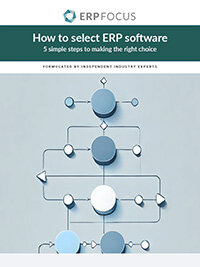Does your ERP selection process need a SWAT team?
The first thing to make clear is that we are not talking about bringing in a team of people in black uniforms to run around lobbing stun grenades. That's rarely a good idea. What we are talking about are the special skills that are required for a successful project: skills that companies need to have, or have access to, before they begin.
S: Strategic Vision
Some companies are quite happy with their existing systems but are compelled to change because of technical reasons. Perhaps their systems are becoming unsupportable, or they are approaching limits on things like database size. Others want to improve on what they have and believe that improvements in operating efficiency will justify the investment in time, effort, and money. It won't.
Peter Drucker told us, “There is nothing so wasteful as doing efficiently that which should not be done at all”. Simply changing or upgrading the software is rarely enough because implementing a new ERP system is about fundamentally changing the way the company works. If it's not, then it's probably not worth doing.
When considering a new system, companies need a vision of where they want to be in 5 and 10 years' time, and a plan of how to get there. ERP will help with the journey but first, they need to identify what they want a new system to do for them. If their KPIs (key performance indicators) were well chosen, then that will help them focus on the things that matter.
So things like reducing delivery lead times, increasing market penetration, and improving customer retention are all things that a sound ERP system will help with and are all things that will make a real difference.
W: Worldly-Wise
For the purposes of this article, the world is the world of ERP. Companies frequently come at an ERP implementation from one of two angles. Some think that a new system is going to solve all their problems, whilst others actually set their ambitions too low. Both result in disappointment when either a company becomes disillusioned during the selection process when they realize they can't get all they want or afterward when results and benefits are measured.
Although there are outliers, companies typically spend the equivalent of between 2.5 and 4 percent of their annual turnover on a new ERP system, so they need to begin by establishing what they can expect to get for that amount of money. If that is not what they had expected, they have two options: they can increase their budget or look at what they are prepared to afford and decide whether that will be sufficient.
It may be that they decide on only a partial replacement of existing systems, with some departments continuing with legacy systems, or it might be that they decide that some elements of the new system are actually 'nice to haves' rather than essentials. But they need to make those decisions before they purchase a new system and not during the implementation itself.
Expectations on timescales also need to be realistic. ERP vendors and SIs can on occasion be overly optimistic if they think that will win them the contract, and the contracts that they present to their clients will have a get-out clause to protect them when the scope of work is 're-evaluated' after project commencement.
Likewise, education and training requirements (the difference between education and training, and the need for both, is discussed in detail here) can be understated to ensure that the original contract price comes within the client's budget even if training needs also need to be 're-evaluated' after contract signature.
In all of these matters, companies that buy a new business system perhaps once every ten years will be dealing with suppliers who sell tens or even hundreds of systems every year. They are clearly at a disadvantage but they can, however, get advice from a range of sources, such as business partners (both customers and suppliers) who have been down the path recently, genuinely independent ERP consultants, and, of course, from this website.
A: Agnostic
We have already mentioned that some consultants have close relationships with particular ERP suppliers and in consequence, are incentivized to recommend the selection of those systems. Even if they have been contracted to help with the selection phase, it is difficult for them not to have preselected the solution before analyzing the problem.
But there is something else to consider. New technology is emerging to further enhance the functionality that ERP systems offer: everything from the Internet of Things (IoT) to Big Data, and from Blockchain to Artificial Intelligence. Consultants want and need experience in these new things, and the only way to get that experience is to work on projects that are using these new tools.
So the temptation to encourage clients to use them is great and that can mean deciding on a tool and then trying to find things to fix with it. Under these circumstances, the client may benefit but the end result may equally not be optimal, and the cost-effectiveness of the solution cannot be guaranteed.
Companies need to ensure that their needs and requirements override those of their consultants.
T: Tried and Tested
In any team, there is a place for people with no experience. Not only do they have to get experience somewhere, but they can usefully challenge things that may have been taken for granted for too long. On the other extreme, some teams have members who, for whatever reason, have gone stale. But, in the middle, good teams have a solid backbone of experience.
Few people become experts at anything quickly, and that is especially true of ERP implementations. If the core of the implementation team is not experienced (and having worked on 3 or 4 projects does not make consultants experienced) then that team will need to be managed very closely by people who do have extensive experience.
But experience not only means a large number of projects but exposure to different industries. Good consultants will have time to learn about your company and, if necessary, your industry, but the experience of different environments will enable them to bring new ideas to the table.
So: no stun grenades but, with careful planning, stunning results.
Free white paper

How to Select ERP
Learn to select your ERP in 5 easy steps by following our expert's advice

Related articles
-

ERP training, and how to train the trainer
Internal or external training - what would be best for your business?
-

How the right ERP can help you launch a successful omnichannel business
Petersen Zhu, CEO of DigitBridge and Vibes Base, shares how to create a scalable omnichannel stra...
-

How to select the perfect ERP project manager
What to bear in mind when selecting an ERP project manager to lead your team

